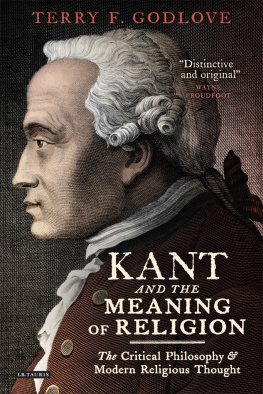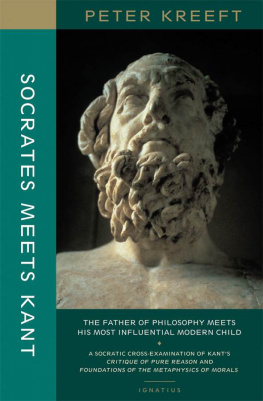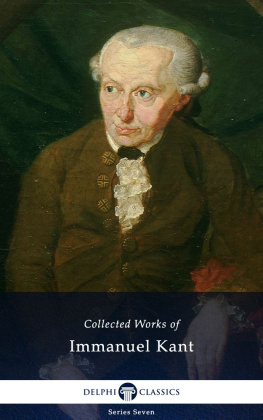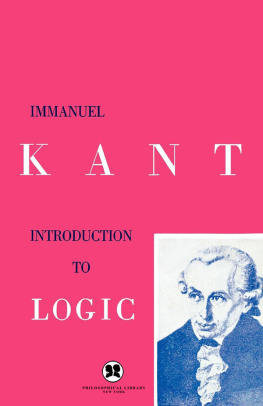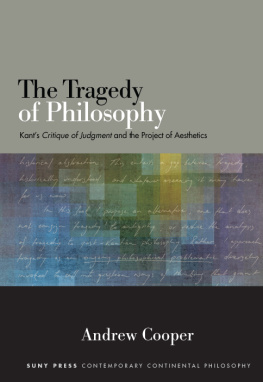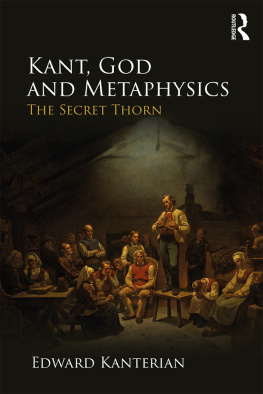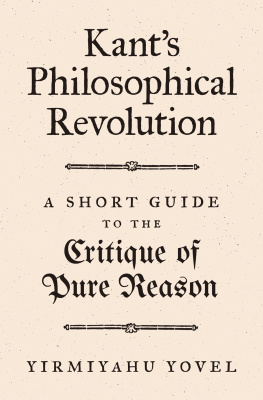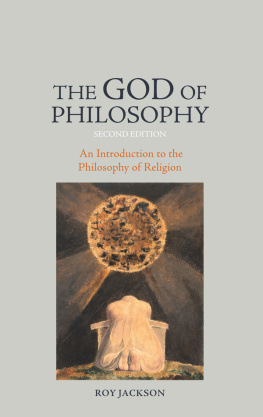Terry F. Godlove is Professor of Philosophy and Religion at Hofstra University. His previous books include Religion, Interpretation and Diversity of Belief (1989, paperback 1997) and Teaching Durkheim (2005). He is a former editor of the Texts and Translations series of the American Academy of Religion.
Kant and the Meaning of Religion aims to show how Kants philosophy serves as a valuable resource for navigating challenging methodological issues in the field of religious studies. Godloves aim is not to commend or support Kants own philosophy of religion but to draw from its epistemology in ways that advance the discussion of key themes in the academic study of religion. This requires the reinterpretation or even rehabilitation of the Kantian themes in question, resulting in fresh perspectives on Kant as well as on the field of religious studies. Godloves book is quite distinctive for the way it draws on Kant to address religious issues with virtually no appeal to the more familiar references to the ethical element in his philosophy of religion. Moreover, the author announces early on that the Kant of this volume has no substantive connection with Christianity, ensuring that his project should have wide application across the field of religious studies and should not be viewed as relevant only to the study of religion in the west. Nor should the volume be seen as one more in a series of works concerning the relative compatibility between Kants religious thought and the biblical outlook. Consequently, one gets the sense of something genuinely fresh and sophisticated in the way in which Kants thought is invoked here. In short, the book is provocative, constructive, and very welcome. I think it has tremendous long-term value and should provoke considerable debate. It reflects not simply the competent efforts of a mature scholar, but the assured work of a seasoned thinker who has a creative and bold suggestion to make about important matters. In suggesting an unexpected but potentially very fruitful way in which Kants epistemology can promote the entire field of the academic study of religion, it is in fact an intellectual head-turner.
Gordon E. Michalson, Jr, Professor of Humanities, New College
of Florida, author of Fallen Freedom: Kant on Radical Evil and Moral
Regeneration
and of Kant and the Problem of God
This is a distinctive and original contribution to the current interest in Kants relevance for the philosophy of religion. Rather than focusing on Kants concept of God and philosophical theology, Godlove shows how his epistemology and reflection on the role of concepts in experience can illumine topics in the study of religion. His reading of Kant is informed by issues raised by Nietzsche, Geuss, Brandom, and McDowell, among others, and by recent theorists of religion. I recommend it highly.
Wayne Proudfoot, Professor of Religion, Columbia University
This bold and carefully argued monograph takes issue with Nietzsches claim that Kant, even in the first Critique, displays himself as a cunning Christian. Godlove convincingly refutes Nietzsche by demonstrating that the key theories defended in the first Critique, especially the distinction between appearance and thing in itself, are not concessions to Christianity. Rather, Kant posed the problem that called into being the philosophy of religion as a modern discipline. Thus, in a way that is distinct from theology (where Gods existence is assumed and/or presumably proved), Kantian epistemology sets theism and atheism on an equal footing, as genuine alternatives, thus making the modern secular age possible for the first time. Godloves provocative claim, that Kant moves toward a reductionist position that ultimately embraces religion without God, is sure to spark resistance from those who see Kants later work (especially Religion within the Bounds of Mere Reason) as the work of a Christian reformer. What will not be debatable, for those who take on board Godloves impressive argument, is that in the first Critique Kant does not express his final position on the meaning of religion, but only lays the philosophical groundwork for his subsequent discussions.
Stephen R. Palmquist, Professor of Religion and Philosophy,
Hong Kong Baptist University

Published in 2014 by I.B. Tauris & Co Ltd
6 Salem Road, London W2 4BU
175 Fifth Avenue, New York NY 10010
www.ibtauris.com
Copyright 2014 Terry F. Godlove
The right of Terry F. Godlove to be identified as the author of this work has been asserted by him in accordance with the Copyright, Designs and Patents Act 1988.
All rights reserved. Except for brief quotations in a review, this book, or any part thereof, may not be reproduced, stored in or introduced into a retrieval system, or transmitted, in any form or by any means, electronic, mechanical, photocopying, recording or otherwise, without the prior written permission of the publisher.
Library of Modern Religion, vol. 40
ISBN: 978 1 84885 528 1 (HB)
978 1 84885 529 8 (PB)
978 0 85773 489 1 (ebook)
A full CIP record for this book is available from the British Library
Typeset in Adobe Caslon Pro by Initial Typesetting Services, Edinburgh
P REFACE &
A CKNOWLEDGMENTS
I began taking courses in religion as an undergraduate, but from the first and throughout graduate school I was easily distracted. In a course on ritual I got stuck on what it is to act intentionally. In a course on religious experience I had trouble getting past the noun. The meaningfulness of religious language? Terrestrial cases seemed hard enough. My teachers were asking whether religion is discovered or inventedbut to me the deeper mystery was over the nature of general concepts. Over time these and other distractions assumed a Kantian form. The result is an attempt to locate Kants theoretical philosophy in a range of contemporary discussions bearing on the study of religion. Individual chapters can be read on their own but my aim has been to present a single train of thought organized around Kants theory of concepts.
For criticism and encouragement I thank Nancy Frankenberry. Thanks also go to Bernard J. Firestone, Dean, Hofstra College of Liberal Arts and Sciences, for and with whom it has been a pleasure to work these last several years. The book has been improved by discussion, support, and feedback from many Hofstra colleagues, including Brian Cox, Tony Dardis, Neil Donahue, Warren Frisina, Gregory Kershner, Mark McEvoy, Ira Singer, Harold Skulsky, Stavros Valenti, Dan Varisco, and Kathleen Wallace. I am also glad to record debts to Wendy Baskett, Ehud Benor, Andrew Dole, Mark Gardiner, Hannah Godlove, Ron Green, Dietmar Heidemann, Amy Himsworth, Wendy Lochner, Brian Mahan, Mike Michalson, Wayne Proudfoot, Kevin Reinhart, Gail Rubin, and Carolann Young, to audiences at a variety of conferences and colloquia, and to several anonymous readers. Neither Henry Levinson nor Hans Pennerboth now deceasedwould find much to like in the details of what follows, but I like to think they could each make out a few larger lessons learned. Readers familiar with Manley Thompsons work on Kant will have no trouble detecting his influence, greater by far than the notes reflect.
This book continues my long and productive association with Alex Wright. For several years, and in various moods, I have been reminding him that this book was his idea. Now I wish only to thank him for his patience and professionalism.
The scaffolding of chapters one and two appeared in article form as Religion in General, not in Particular: A Kantian Meditation,
Next page
